„Man is a part of nature,
not its ruler.“
Scroll down
Things cannot go on as they are
An extension of the present no longer has a future. Our globalised, ruthless world based on the organisation of inequality no longer works. It consumes more and more irreplaceable resources. It is driving the climate crisis unchecked. It cannot provide food, water, education, health or peace for most of the world’s people.
We search for solutions
Solutions that make a good life possible without scarcity and abundance. But we will not find these solutions if we persist in old ideologies. The thinking that is responsible for the problems cannot find solutions.
Pierre Ibisch and Joerg Sommer counter the old thinking that causes the crisis with their philosophy of ecohumanism, which is radical in a positive sense.
They plead for grounding our thinking: Starting from nature and moving towards the human being. Their passionate and encouraging manifesto links the acceptance of planetary boundaries with the goal of a just world – and puts humans and their strengths at the centre of the debate about ecology and our future.
On this page we present the principles of ecohumanism – they are impressively simple, yet demanding …
The Ecohumanist Manifesto
The order of our globalised world based on egoism leads to more and more resource consumption and drives climate change unchecked, but can guarantee neither food nor water, education, health or peace for many people. Pierre Ibisch and Joerg Sommer analyse the global problems as well as the often naïve proposals to overcome them. They counter the old thinking that causes the crisis with their philosophy of ecohumanism, which is radical in a positive sense. They plead for grounding our thinking: Starting from nature and moving towards the human being. Their passionate and encouraging manifesto links the acceptance of planetary boundaries with the goal of a just world – and puts people and their strengths at the centre of the debate about ecology and our future.
Pierre Leonhard Ibisch, Joerg Sommer
Das Oekohumanistische Manifest
Unsere Zukunft in der Natur
176 Seiten, € 15,- ISBN 978-3-7776-2865-3
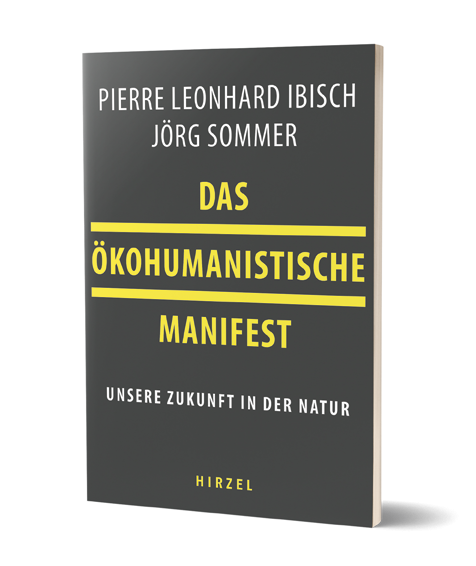
„The Ecohumanist Manifesto strikes at the heart of today’s necessities. Congratulations!“
Ernst von Weizsaecker, Honorary President of the Club of Rome
Nature
shows us
the yellow
card
The crisis of humanity is comprehensive, there has never been so much risk as today. That is bad.
And it is good.
Because more and more people are recognising the many facets of this crisis. They are feeling the effects first hand.
They sense that our global way of life will not work like this for much longer.
Global temperature anomalies
in °C
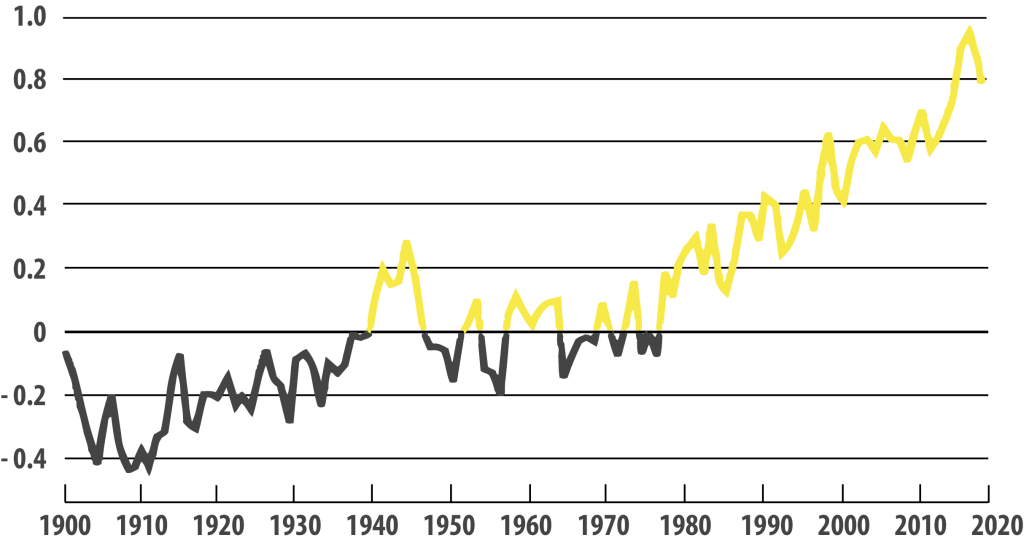
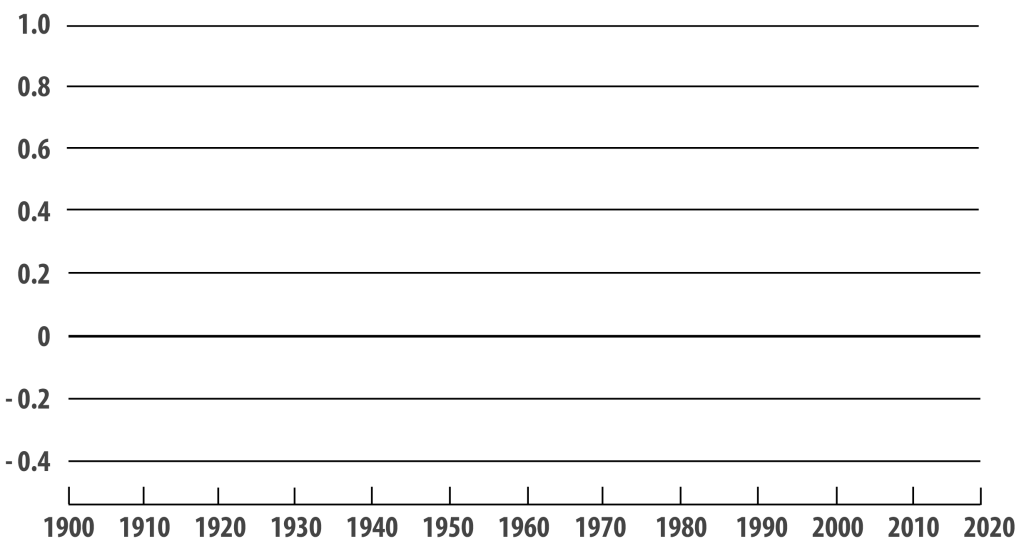
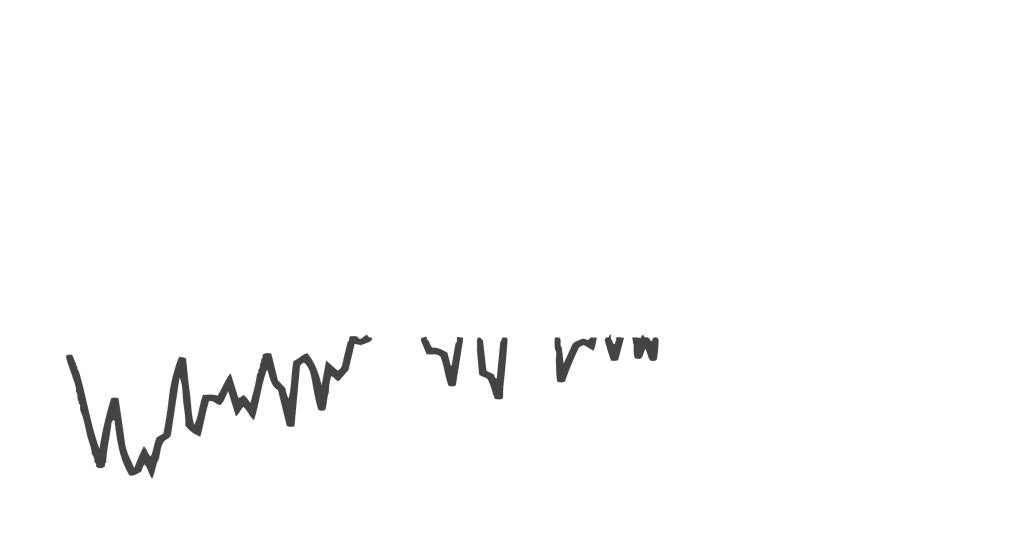
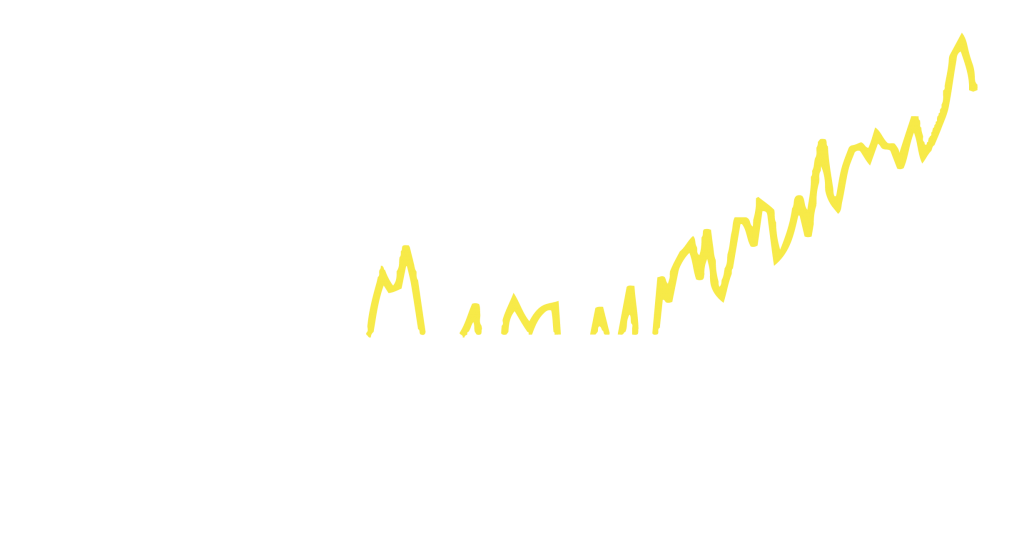
Source: National Oceanic and Atmospheric Administration
Quick action?
Or correct action?
The climate crisis puts us in a panic. People in panic act. But they act rashly.
We are up to our necks in the mire – and we are pedalling ever more wildly. But that only brings us closer to sinking faster.
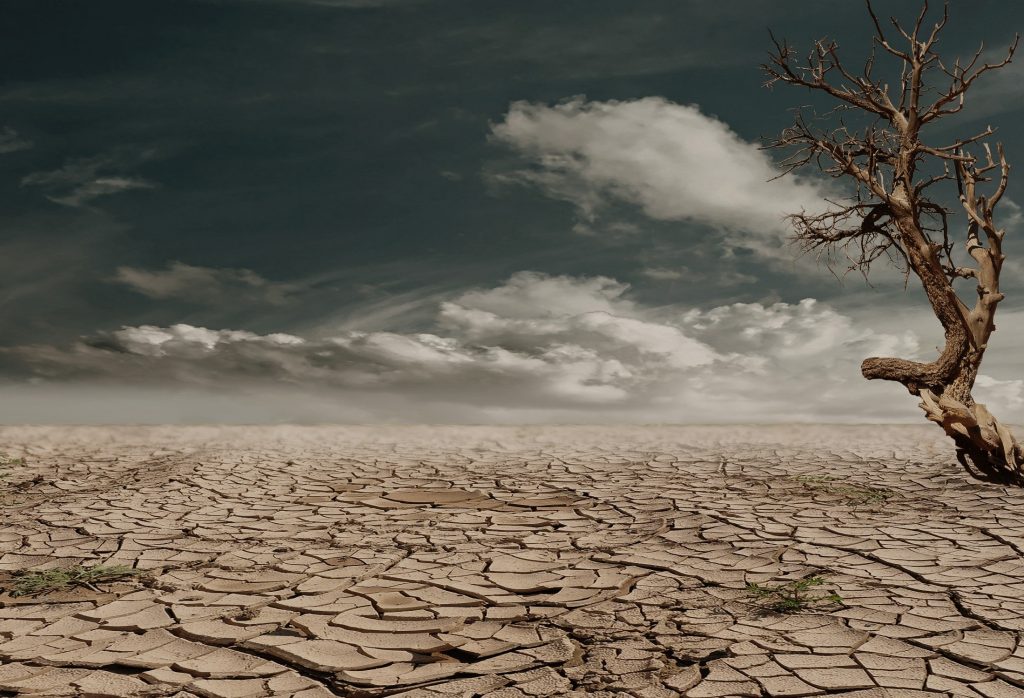
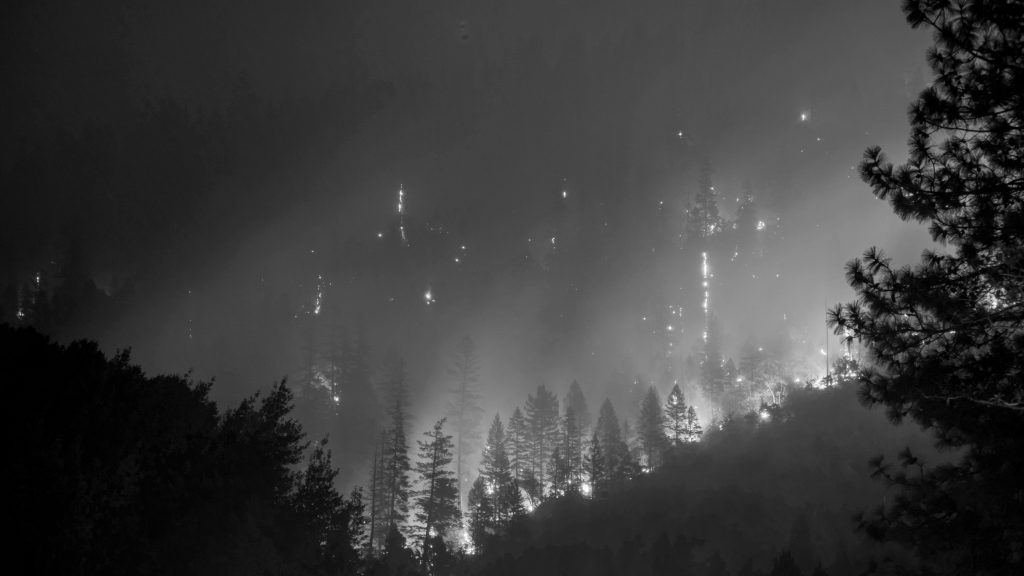
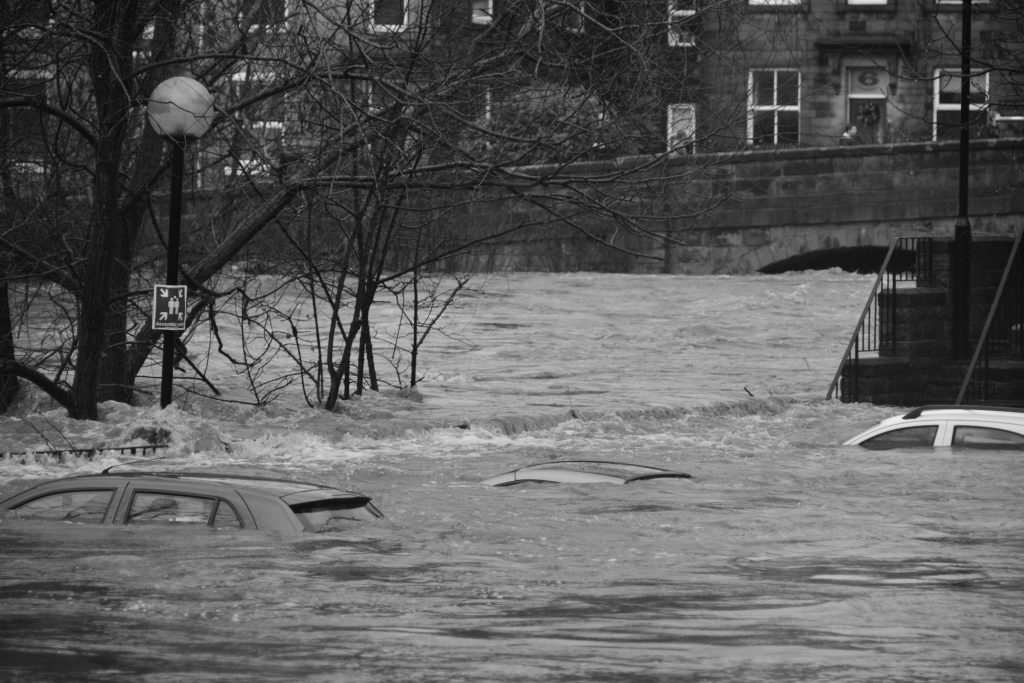
Things cannot go on as they are
We prefer to plant millions of trees instead of letting the still existing forest do its work in peace.
We waste vast amounts of coal, oil and nuclear energy today – and plan to waste even more solar, hydro and wind energy in the future instead.
We believe we can repair nature, suck CO2 out of the atmosphere and clean out the consequences of our civilisational aberrations in a technology-driven way.
We still believe we can save the earth by completely subjugating it to us.
This thinking will only accelerate the catastrophe. It is wrong. Because it is neither ecological nor humanistic.
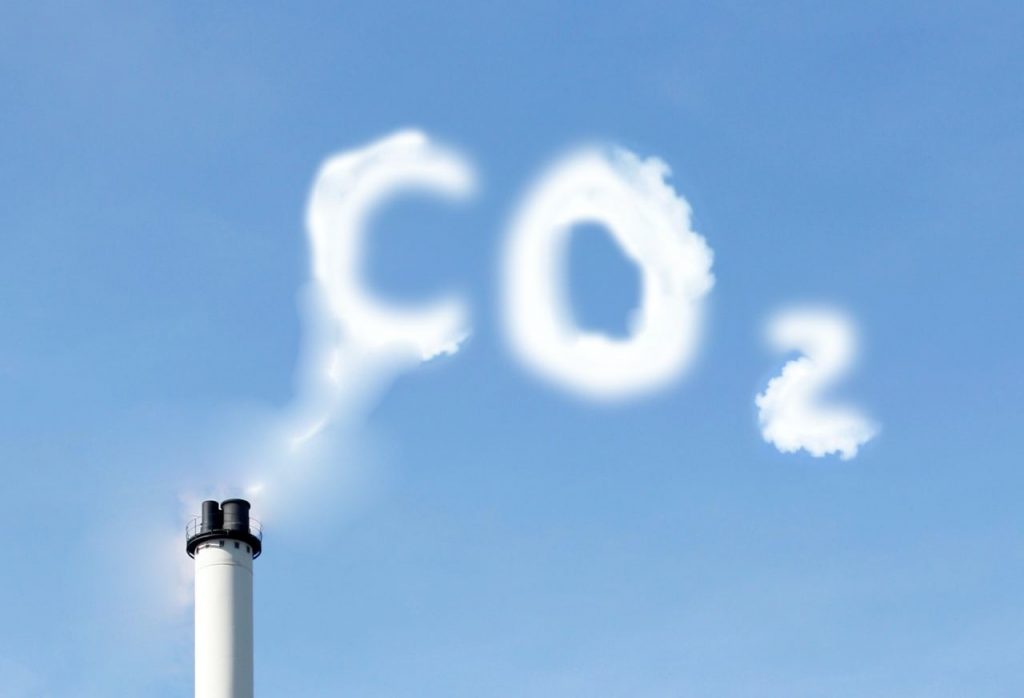
It's not about doing anything,
it's about doing the right thing.
This is ecohumanism
1. the acceptance of the ecological boundaries and our role as a component of this ecosystem.
and
2. the universal human right to a good life for all people today and in future generations.
Everything else follows from this. If we think these two principles further, if we apply them to the great challenges of our time, if we consider climate change, social injustice, war, flight and expulsion and other seemingly insoluble problems against this background, fascinating answers emerge. If we let ourselves get involved, undreamt-of possibilities arise.
Applied consistently, ecohumanism offers answers to all the big questions of our time.
VOICES ABOUT THE BOOK




The Ecohumanist Manifesto
The order of our globalised world based on egoism leads to more and more resource consumption and drives climate change unchecked, but can guarantee neither food nor water, education, health or peace for many people. Pierre Ibisch and Joerg Sommer analyse the global problems as well as the often naïve proposals to overcome them. They counter the old thinking that causes the crisis with their philosophy of ecohumanism, which is radical in a positive sense. They plead for grounding our thinking: Starting from nature and moving towards the human being. Their passionate and encouraging manifesto links the acceptance of planetary boundaries with the goal of a just world – and puts people and their strengths at the centre of the debate about ecology and our future.
Pierre Leonhard Ibisch, Joerg Sommer
Das Oekohumanistische Manifest
Unsere Zukunft in der Natur
176 Seiten, € 15,- ISBN 978-3-7776-2865-3

Foundations of ecohumanism in ten theses
In their ECOHUMANIST MANIFESTO, the authors substantiate ten theses. They present the foundations of ecohumanism and question all the premises on which our modern, globalised, reckless way of living and doing business is based. They are justified in detail in the book, here we present them briefly:
1. there is no contradiction between man and nature contradiction
A friend of the earth is a friend of humanity
The earth’s ecosystem offers us all the resources we need and at the same time sets us non-negotiable limits. We do not have to subordinate ourselves to nature, but we must see ourselves as part of the whole. This is responsibility, a question of power and also a human right.
2. wisdom is in all of us
Learning from and with nature for humans
We know what we humans need to know in order to create a good life for all in and with nature. It is the urgent task of a society to let this knowledge become the basis of our common actions.
3. nature is always right
Natural laws are not negotiable
We are not slaves to nature, but we cannot control it either. We do not have to help nature to its rights, it enforces them itself. Nature does not need protection. But protected nature is a human right.
4. there is no ownership
The illusion of ownership needs new answers
Understanding humans as part of the ecosystem also means recognising that ownership is only a conceit. A highly dangerous one at that. You cannot own something of which you are a part. Nor is it necessary: good living does not require ownership. It is a process that requires prudence and justice.
5. economy is a tool
Nature teaches us sustainable economic activity
Economic activity is nothing other than dealing with limited resources. The only task of the economy is to use these resources in such a way that a good life for all is possible in nature and with nature.
6. technology is not liberation
Humanity is not programmable
Technical progress is not a good thing. It can be a contribution to the good if it is good for people and the ecosystem. This requires steering. This is called ethics, not the market.
7. faith is not an instruction for action
Ecohumanism and spirituality are compatible
We are forced to deal with our immense not-knowing. Faith can be an answer. It becomes dangerous where faith declares knowledge to be arbitrary and justifies action – or non-action.
8. humanity is a skill
Developmental support, not education, is what we need
Just as we cannot build nature according to our will, we have failed since time immemorial to shape and form human beings. The path to humanity is not through institutions, but through social processes. The keys are self-empowerment and self-efficacy.
9. power is a deception
Shaping society cannot be delegated
The future is not a service, but a central task of society. It is too important to be left to governments. A nature-compatible, just society can therefore only be a participatory one. It will replace many tasks of representative institutions with the permanent participation of the many. On a much larger scale than imaginable today.
10. everything is a question of principles
We need attitude instead of rules
Acceptance of natural limits is not a rule. Humility is not a rule. Freedom is not a rule. Justice is not a rule. Neither is humanity. They are principles. If we take them to heart, a good life is possible for all.
„Against the background of the dramatic statements of the new IPCC report, The Ecohumanist Manifesto is an important, stirring and at the same time encouraging book.
The 10 theses of the two authors contain inspiring and radical proposals for a changed life in and with nature.“
Prof. Dr. Heike Walk, Acting President of the University for Sustainable Development Eberswalde (HNEE)
The authors
Pierre Leonhard Ibisch is a biologist and professor of nature conservation at the University for Sustainable Development in Eberswalde. Joerg Sommer is a political scientist and sociologist, journalist, book author and Chairman of the Board of the German Environmental Foundation, which was founded in 1982 and is the oldest and, with over 3,500 donors, largest community foundation in Europe. In June 2021, he was awarded the Federal Cross of Merit for his commitment to environmental and climate protection.

„A shocking stocktaking and a courageous, radical approach to reorganising the relationship between nature and human society! The book has what it takes to be a real manifesto for the future! Definitely a must read!“
Jens Spilgies, Parents For Future Germany